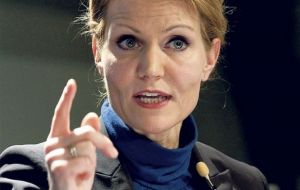MercoPress. South Atlantic News Agency
Non-Euro Denmark has assumed the 27 member EU presidency
 PM Helle Thorning-Schmidt wants to act as a ‘bridge’ between Euro and non Euro members
PM Helle Thorning-Schmidt wants to act as a ‘bridge’ between Euro and non Euro members Denmark has assumed the presidency of the European Union as the 27-member bloc continues efforts to tackle the crisis ravaging the continent. Prime Minister Helle Thorning-Schmidt has said Denmark aspires to “strengthen the EU in a difficult time.”
High on the EU agenda are moves to strengthen integration in the 17-member Euro zone to avert future crises, with non-Euro nations like Denmark also invited to join a new fiscal compact. Britain has however said it would not take part.
Denmark hopes to serve as a “bridge” between members of the Euro zone and those outside, Danish EU Affairs Minister Nicolai Wammen said recently in Brussels.
Denmark itself has kept itself out of the now deeply troubled Euro zone, while leaders of the EU two biggest economies - Germany and France - have increasingly taken the reins in Europe to manage the Euro crisis. This power play by German Chancellor Angela Merkel and French President Nicolas Sarkozy has annoyed many, including Jean-Claude Juncker, president of the Eurogroup, but also PM from tiny Luxembourg.
“Why does anyone think that it's enough for Germany and France to reach agreement?” Juncker said. “We're dealing with 17 governments, 17 countries and 17 parliaments.”
In order to dig themselves out of this crisis, most member states agreed at a recent summit to commit to more fiscal discipline. Only Britain, wielding a veto, made it clear it would not participate in any sort of fiscal union, while Sweden and Denmark remain ambivalent.
Apart from the euro crisis, Denmark will also have to mediate disagreements in the upcoming discussions on the EU 2014-2020 budget. But those sure-to-be-thorny negotiations have not frightened Thorning-Schmidt, who noted recently that consensus “is a Danish specialty,” recalling that she heads a three-party government coalition requiring compromise between her Social Democrats, the Socialists and the Social Liberals.
The Danish presidency also intends to focus on renewable energies to bolster job creation and economic growth in Europe.
“Every Euro spent on energy efficiency will go to ensuring European jobs,” said Danish Climate Minister Martin Lidegaard. “Every Euro spent on oil imports will go out of Europe. This makes the green agenda one of the most important in Europe's future cooperation.”




Top Comments
Disclaimer & comment rulesCommenting for this story is now closed.
If you have a Facebook account, become a fan and comment on our Facebook Page!